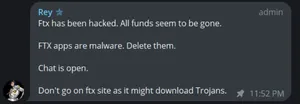The total funds stolen appear to be around $4.17 million, according to analysis by SlowMist.
Over $4 million drained from DeFiAI
- Tweet by DeFiAI
- Analysis by Slowmist
Tokensoft intentionally publishes personal data of around 5,000 users who they believe are "bad actors"
Several users replied to the message in shock that their data was exposed, saying they'd never done anything wrong. The Tokensoft employee replied, "If you made it on the naughty list...yes, shame on you....I shared your info, better luck next time".
The project later deleted the link from the Discord server, then tried to claim that it had never been posted at all, then issued a statement that "information was mistakenly posted in Tokensoft's social media channels".
Bahamas Securities Commission issues statement that they didn't instruct FTX to process withdrawals for Bahamian customers
This contradicted FTX's previous statement that "Per our Bahamian HQ's regulation and regulators, we have begun to facilitate withdrawals of Bahamian funds." The announcement that they would be processing withdrawals for Bahamian customers led to a slew of non-Bahamian customers trying to find ways to withdraw their funds via bribes and shady NFT deals.
Some have viewed FTX's choice to enable Bahamian withdrawals as evidence that they were trying to allow FTX employees and family members to get access to their funds on the exchange, even when most customers had no such access.
Crypto.com CEO admits company accidentally sent 320,000 ETH ($416 million) to another crypto exchange a few weeks prior
Crypto.com's CEO, Kris Marszalek, replied: "It was supposed to be a move to a new cold storage address, but was sent to a whitelisted external exchange address. We worked with Gate team and the funds were subsequently returned to our cold storage." He later clarified that all of the funds were returned.
Twitter users, reasonably, reacted in horror at the revelation that the platform had accidentally sent such a substantial portion of their funds elsewhere in a careless mistake, and that such a monumental mistake was even possible. They were lucky that they erroneously sent the funds to another exchange, and one who agreed to return the funds.
This is not the first time Crypto.com has erroneously transferred funds; in August of this year, they sued a woman to whom they'd accidentally sent $7.2 million that wasn't hers.
FTX claims it was hacked as more than $400 million is withdrawn
An FTX account administrator wrote on the FTX support Telegram, "FTX has been hacked. FTX apps are malware. Delete them. Chat is open. Don't go on FTX site as it might download Trojans". The message was pinned by FTX General Counsel Ryne Miller.
Miller later wrote on Twitter, "Investigating abnormalities with wallet movements related to consolidation of ftx balances across exchanges - unclear facts as other movements not clear. Will share more info as soon as we have it."
A Telegram admin subsequently wrote, "Not all hope is lost. Engineers have managed to retrieve substantial amount of funds," but no details were provided beyond that. A later announcement by Miller claimed that FTX had "initiated precautionary steps to move all digital assets to cold storage", suggesting some of the transfers may have been a part of that effort.
Many speculated that the so-called hack had been coordinated by insiders.
FTX files for bankruptcy, Sam Bankman-Fried resigns
FTX announced that it had filed for Chapter 11 bankruptcy in the United States. Sam Bankman-Fried resigned as CEO.
SBF had spoken about trying to raise additional funds. In leaked Slack messages, he had allegedly written that "One could maybe say, if they wanted to be optimistic, that we have a lot theoretically in and/or potentially for the raise". No one was actually saying this.
Early crypto investor loses $42 million in wallet compromise
Analysis by the crypto security firm SlowMist attributed the theft to a compromise of Shen's seed phrase. Shen had been using the Trust Wallet software, though the theft does not appear to be related to security issues with the wallet software.
Users attempt to circumvent FTX withdrawal freeze with bribes and NFTs
"Any FTX employees willing to change my accounts country of residence to Bahamas to facilitate withdrawal I am offering $1 million and unlimited legal fees", wrote one trader (who later claimed to be joking).
A popular crypto Twitter user named "Algod" offered $100,000 to any FTX employee who would process their KYC documents, allowing them to withdraw. He was subsequently seen to be successfully withdrawing over $2 million in assets from the platform. He also shared links to a Telegram group where his partner was offering to buy people's FTX accounts for 10¢ on the dollar, from customers who feared they may never see the money again, or would only regain access to a fraction of it after years of court proceedings. Algod later denied "erroneous and defamatory statements" that he'd bought discounted claims/assets", admitting that he'd considered it, but claiming he ultimately decided not to.
Some observers noticed over $21 million withdrawn via NFT trades, that appeared to be being used as a way to bypass the internal blocks on users transferring balances to one another. People with funds locked in FTX bought NFTs from Bahamas-based users, spending their full account balance on the NFT and thus enabling the Bahamian user to then withdraw the funds. "This appears to be the first recorded case of NFT utility in existence 👍", wrote Cobie.
The Securities Commission of the Bahamas freezes FTX assets, appoints provisional liquidator
The announcement went on to say, "The Commission is aware of public statements suggesting that clients' assets were mishandled, mismanaged and/or transferred to Alameda Research. Based on the Commission's information, any such actions would have been contrary to normal governance, without client consent and potentially unlawful."
- Media release by the Securities Commission of the Bahamas
DFX Finance suffers $5 million loss
BlockFi suspends withdrawals
Now, the bailer is the one requiring the bailing, and the possible bailout of FTX by Binance fell through. This means that BlockFi is in a tough and uncertain spot, which is why they announced through Twitter that "until there is further clarity, we are limiting platform activity, including pausing client withdrawals". They also wrote that they had learned about the FTX collapse via Twitter.
BlockFi founder and COO Flori Marquez had tweeted only two days prior, just after the FTX news, that "All BlockFi products are fully operational. BlockFi is an independent business entity. We have a $400MM line of credit from FTX.US (not FTX.com) and will remain an independent entity until at least July 2023. We are processing all client withdrawals."
The Binance/FTX deal is off
According to Binance, "As a result of corporate due diligence, as well as the latest news reports regarding mishandled customer funds and alleged US agency investigations, we have decided that we will not pursue the potential acquisition of FTX.com."
FTX is really up a creek. Reports suggest that the hole on their balance sheet is looking like $8 billion, a circumstance that is certainly not improving as FTT prices continue to plummet.
There is still no news about what will happen to Alameda, but the SBF-owned quant firm's website has ominously been taken offline.
- Tweet by Binance
- "Binance Walks Away From Deal to Rescue FTX", The Wall Street Journal
FTX is insolvent; Binance offers bailout
It appears that the Binance move was a last-ditch effort to save FTX, which went from being a powerful player in the crypto market offering bailouts and looking to acquire bankrupt companies to an insolvent exchange struggling to stay afloat in an incredibly short period of time.
CZ of Binance hedged a bit in his announcement, underscoring that "Binance has the discretion to pull out from the deal at any time" and would be performing "full [due diligence]" before the deal moved forward. It's not yet clear how much the Binance sell-off of FTX tokens contributed to the instability of the exchange.
Speculation emerges around Alameda Research and FTX solvency; Binance liquidates holdings
Following the report, Binance CEO Changpeng "CZ" Zhao announced they would be liquidating their FTT holdings. CZ also took a shot at SBF's recent controversial policy recommendations, writing, "Liquidating our FTT is just post-exit risk management, learning from LUNA. We gave support before, but we won't pretend to make love after divorce. We are not against anyone. But we won't support people who lobby against other industry players behind their backs."
SBF first appeared conciliatory towards Binance, writing "I respect the hell out of what y'all have done to build the industry as we see it today, whether or not they reciprocate, and whether or not we use the same methods. Including CZ. Anyway -- as always -- it's time to build. Make love (and blockchain), not war." However, he later wrote that "A competitor is trying to go after us with false rumors" and urged that "FTX is fine. Assets are fine."
Federal judge rules that LBRY sold tokens in violation of federal securities laws
In March 2021, the SEC sued LBRY over their LBC tokens, which were used for paid streaming, tipping, and as rewards for using the platform inviting other users. On November 7, 2022, a federal judge of the District Court for the District of New Hampshire ruled that "because no reasonable trier of fact could reject the SEC's contention that LBRY offered LBC as a security, and LBRY does not have a triable defense that it lacked fair notice, the SEC is entitled to judgment." The judge granted the SEC's motion for summary judgment, meaning the case will not go to trial.
U.S. Attorney convicts individual in 2012 theft from the Silk Road, announces seizure of over 50,000 Bitcoin priced at more than $1 billion
The government has filed a motion in the case against Ross Ulbricht, the founder and operator of the Silk Road who is serving life in prison, seeking to retain the seized Bitcoin. At the time of seizure in November 2021, the Bitcoin were notionally worth $3.36 billion. On the date the charges were announced, they would be notionally worth $1.06 billion.
- "U.S. Attorney Announces Historic $3.36 Billion Cryptocurrency Seizure And Conviction In Connection With Silk Road Dark Web Fraud", U.S. Attorney's Office for the Southern District of New York
Pando exploited for $20 million
Telegram repossesses usernames so they can sell them as NFTs
Telegram later introduced some of the repossessed usernames for sale as pricey NFTs on their new "collectible usernames" market, dubbed Fragment. Although Durov had claimed that "70% of all Telegram usernames had been reserved in inactive channels by cybersquatters from Iran", and that the only usernames that were "withdrawn" had been out of use, users were given no warning or option to keep their names.
On October 27, Durov announced that "in a few days, we will also introduce the ability for users to sell their existing usernames on Fragment" — unwelcome news for those whose usernames were sold out from under them by Telegram.
Some of the usernames that have sold on the marketplace include brand names like Facebook (which sold for 60,000 TON, or ~$94,200), FIFA (sold for 600,000 TON, or ~$972,000), Amazon (sold for 262,500 TON, or ~$425,000), and Meta (sold for 404,000 TON, or ~$723,000). There is no indication the buyers are necessarily associated with the brands in question. Furthermore, the username marketplace is not available in the USA.
Monkey Drainer steals dozens more NFTs, nets around $867,000
Gala Games tokens drained by project claiming to help them; Huobi claims the project profited
However, the Huobi crypto exchange has claimed that pNetwork's actions were not white hat, and that they profited $4.5 million from their actions. pNetwork rebutted that they had not made any money from the operation, and threatened to sue Huobi over the accusations.
Some traders who attempted to "buy the dip" and profit from the plunge in value of the GALA tokens were also upset with Huobi, when they found that the exchange had replaced their tokens with new, worthless $pGALA tokens.
Skyward Finance treasury drained of $3.2 million
The project was unusually frank in their announcement, writing on Twitter that the hack had "render[ed] the Treasury and the $SKYWARD token effectively worthless... We recommend users to withdraw their funds safely where they can and for the community to no longer interact with Skyward."
Iris Energy Bitcoin mining firm close to defaulting on loans of $103 million
Oracle attack on Solend costs the project $1.26 million
Rubic exchange private key compromised, token plummets
The enormous sale caused the token price to plummet from $0.082 to $0.016, an 80% decrease. The stolen tokens were nominally worth almost $2.8 million (priced at the value before the theft), but it's not likely the attackers were able to exchange them for that much given the lack of liquidity to absorb such a huge sale.
Crypto exchange Deribit hacked for $28 million
Deribit is also among the primary creditors of failed crypto hedge fund Three Arrows Capital, which defaulted on an $80 million loan from the exchange.
Founders of Hodlnaut attempt to hide financial records from court
Sounds like everything's above board over there! It was also exposed in August that the company had lied to its users about their exposure to the Terra collapse.
French fry-themed DAO loses $2.3 million due to Profanity exploit
Anyway, friesDAO seems to have fallen victim to the same Profanity vulnerability that has affected projects who used the tool to generate vanity wallet addresses. friesDAO wanted a wallet address beginning with 51D35 ("SIDES"), and as a result they opened themselves up to a major loss.
The project had previously announced that they had raised $5.4 million in funding, suggesting this attack drained almost half of the project's funds.
Core Scientific Bitcoin mining operator warns of missed payments, possible bankruptcy
Core Scientific blamed their precarious financial situation on "the prolonged decrease in the price of bitcoin, the increase in electricity costs, the increase in the global bitcoin network hash rate and the litigation with Celsius Networks LLC and its affiliates". Bankrupt crypto platform Celsius owes Core Scientific around $5.4 million.
Core Scientific's stock plummeted from around $1 a share to around $0.20 on the news, an 80% decrease. The stock started the year at $10.43 a share, and has decreased in value by 98% year-to-date.
$14.5 million stolen from Team Finance
Monkey Drainer steals ~$1 million in 24 hours
Oracle manipulation attack on a QuickSwap market earns exploiter $188,000
Security firm PeckShield initially suggested the issue might have been with QiDAO, which creates the $MAI stablecoin. The vulnerability is not with their project, although it's possible that the theft will impact the collateralization of their stablecoin.
Freeway halts withdrawals, accused of $160 million rug pull
Worryingly, the company also removed all mentions of its team from their website, and reportedly removed an attestation to the company's financial backing as well.
The day before the project announced the pause, crypto whistleblower and researcher FatMan published a Twitter thread urging people to withdraw funds immediately because he believed they were operating a Ponzi scheme. "In my opinion, it's likely that Freeway will collapse within the next few months and that all depositors will lose everything."
Attacker drains tokens from Layer2DAO, project buys some of them back
The attacker swapped 16.7 million of the tokens before the project was able to negotiate a deal to buy back the remaining 33.2 million tokens at a price of $0.001. In the end, the hacker made off with the $33,200 paid by Layer2DAO, plus 40.4 ETH (~$54,000) from the tokens they were able to sell.
The Layer2DAO team seemed unsure how the hack had happened, but said that they believed it was similar to the June 2022 incident in which an attacker got hold of 20 million Optimism tokens after Wintermute provided an incorrect wallet address.
Several users report losing more than a million dollars each in 3Commas/FTX theft
One user wrote they lost almost 104 BTC (~$2 million) from an account that they said they only ever connected to FTX a year ago, with an API key they had not saved, and which had since expired and been downgraded to a free account. Another reported losing about $1.5 million.
FTX CEO Sam Bankman-Fried wrote on Twitter that FTX would compensate the affected users for roughly $6 million in total. He wrote in all caps that he did not want this to be considered a precedent, and it was "a one-time thing". He also stressed that FTX was not responsible for the exploit, and that the users had been tricked by phishing sites impersonating other reputable trading services.
Warner Bros. reinvents DVD navigation menus with their web3 "Movieverse"
Now, you have of course already been able to purchase or stream The Lord of the Rings: The Fellowship of the Ring (Extended Version) for twenty years now. But now you can buy a $30 or $100 NFT to get the same thing, which also boasts "themed navigation menus based on iconic locations from the beloved film". So one of those DVD navigation menus. The NFTs come with other vagaries, including "8 hours of special features, image galleries, [and] hidden AR collectibles".
Plus, of course, you can "own and trade the experience in a community marketplace".
Two days after launch, 4,203 of the 10,000 "Mystery Edition" NFTs have sold for their $30 mint price. They're already reselling on the secondary market for as low as $7.99. The $100 mint "Epic" NFTs are doing slightly better — all 999 of those were minted, and are reselling on the secondary market for around $200. All told, WB has made around $225,000 off the mint.
Almost $300,000 stolen from Olympus DAO, later returned
Olympus DAO wrote in an announcement that "This bug was not found by 3 auditors, nor by our internal code review, nor reported via our Immunefi bug bounty." They also noted that because they had done a phased rollout of the contract, only a limited amount of the project's substantial funds were at risk.
Olympus DAO initially announced that they would "compensate all affected bonders in full", but later revealed that the stolen funds had been returned. According to The Block, the Olympus team had successfully tracked the hacker and negotiated the return of the funds.
Unstoppable Domains disables .coin extensions, illustrating an issue with the idea that "you'll always own your NFT"
.eth), and they typically map to a crypto wallet address.The organization just discovered that they were not the first to go around selling .coin "domains" (represented by NFTs), and were at risk of running into collisions. As a result, they decided to no longer sell these domains, and stop their libraries and services from resolving them.
But fear not, they said, because "Unstoppable domains are self-custodied NFTs, so you still own your .coin domain, but it won't work with our resolution services or integrations."
That's right, folks, you'll still have your .coin NFT! It just won't resolve, or be otherwise useful in any way.
This is much like the argument that has been common in crypto when describing a use case for NFTs: "if it's an NFT, you'll be able to really own your World of Warcraft sword, and Blizzard won't be able to take it away from you if they arbitrarily decide to ban you or remove the item!" This ignores the fact that the existence of an NFT on a blockchain does not ensure that some functionality initially advertised will continue to work in perpetuity, and you might end up with a domain name or a sword that can do nothing more than sit in your crypto wallet collecting dust.
Unstoppable Domains has offered to credit purchasers of .coin domains 3x their purchase price, though this will likely not be as appealing to people who held domains they hoped to flip for much higher than the initial price.
- "Why we’re no longer offering .coin", Unstoppable Domains
Vulnerability in BitBTC bridge ends in an exploit where the clock is ticking
Less than a day after publishing the thread, someone did exactly what the researcher described, and was able to cause the bridge to mint and transfer 200 billion BitBTC. BitBTC aims to be valued at 1/1,000,000 of a BTC, meaning the exploiter on paper just landed themselves 200,000 BTC, but this is another case where massive amounts of a token were created and could never be traded for anywhere near their ostensible "value". BitBTC doesn't have publicly available data on the backing of their tokens, but it's certainly nowhere near 200,000 BTC. The project appears to be very new, and was created by a self-described "19 year old Bitcoin believer".
BitBTC has seven days from the time of the hack to fix the issue in their bridge before the transfer is complete and the attacker is awarded the tokens. Meanwhile, the hacker left an Ethereum transaction note to say that "I'm not a hacker, just want to test the exploit with a [proof of concept], won't touch any of the valuable assets."
Moola Market exploited for $8.4 million
This attack was executed similarly to the Mango Markets exploit a week prior. Moola Market tweeted that they had "contacted law enforcement and taken steps to make it difficult to liquidate the funds. We are willing to negotiate a bounty payment in exchange for returning the funds within the next 24 hours." The attacker did eventually return 93% of the funds, keeping the remaining $588,000 as a "bug bounty".
Roofstock claims to have completed its first one-click NFT home sale
Needless to say, there were more than a few questions around the legal and tax ramifications of this. Some of the more crypto-minded spoke excitedly of "the ability to easily fractionalize your properties or take loans against it in a decentralized way" that this might unlock, while the rest of us were left wondering what a defi loan default and foreclosure would look like.
As much as I agree the real estate system could use some improvements, introducing the ability for someone to hack my crypto wallet and take my house is not quite what I had in mind.
Much-anticipated "speedy" Aptos chain launches, processing 4 transactions per second and with 80% of tokens allocated to insiders
This was not the only criticism of Aptos upon launch. The Aptos token was quickly put up for sale on exchanges including FTX and Binance, but Aptos had not yet published information about their tokenomics — leaving would-be investors trying to make decisions about whether to purchase a token about which they couldn't find even basic information. Once the tokenomics were published, people expressed concerns about the distribution: 80% were allocated to the team and investors and staked, enabling them to dump the staking rewards on retail investors.
Texas regulators are investigating FTX and Sam Bankman-Fried for possible securities violations
According to Rotunda, there is an ongoing investigation by the TSSB into whether FTX has been offering unregistered securities to United States residence in the form of yield-bearing accounts. He alleged that FTX's claimed attempts to segregate US users to the separate FTX.US exchange, the software makes no apparent attempt to do so, and offered yield-bearing accounts to customers who had signed up with a U.S. address — potentially in violation of securities laws.
Rotunda submitted the filing in the Voyager bankruptcy case to argue that FTX should not be permitted to buy Voyager's assets until they have been determined to be compliant with securities law. He wrote, "[FTX yield-bearing] products appear similar to the yield-bearing depository accounts offered by Voyager Digital LTD et al., and the Enforcement Division is now investigating FTX Trading, FTX US, and their principals, including [FTX CEO] Sam Bankman-Fried."
BitKeep Swap hacked for more than $1 million
This is the second hack in October of the swap functionality of a crypto wallet, with Transit Swap suffering a $21 million hack on October 1 — although in that case, the attacker subsequently returned a large portion of the stolen funds.
Tokens notionally worth $825,000 stolen from Syntropy in venture capital investment deal gone wrong
Some supporters of Syntropy have questioned the team's decision to take a deal like this from a VC firm after the firm claimed to be fully funded, and without communicating with the community. Others questioned how the deal could have possibly gone so wrong in the way Syntropy claimed.
Over 51% of blocks validated on the Ethereum chain are censored
This 51% threshold doesn't pose an immediate threat to Tornado Cash users, because even validators that censor transactions will still attest to the validity of blocks created by non-censoring validators. However, if 51% or more of validators were to also stop attesting to non-censored blocks, they would no longer be able to be added to the chain.
Earning.Farm exploited for $971,000, exploiter gets frontrun by MEV bot
Amusingly, one of the transactions by the hacker was frontrun by a MEV bot known as 0xa57, which made a tidy 480 ETH (~$623,000) from the attack. The second transaction succeeded, landing the attacker 268 ETH (~$348,000). According to a MEV researcher, 0xa57 has been known to return funds that were obtained as a result of a hack.
DAO Maker allegedly tries to dodge hack repayment promises
Now that year mark is approaching, and a report from Rekt alleges that DAO Maker is trying to wiggle out of their promises through a governance vote, which they've framed as trying to "prevent major $DAO DUMP from USDR distributions". Meanwhile, they've deleted the post that explained the original distribution plan.
Most members of the DAO today were not affected by the attack, and so stand to benefit from not honoring the payout. One voting option suggests that these users "had their chance" to cash out their USDR, apparently ignoring that people were holding out for the promised 110% redemption.
Some whistleblowers have also claimed that team members have recently moved large quantities of DAO tokens to various wallets to vote. Some have also claimed that those team members recommended buying USDR tokens several months ago for below $1.10, as a safe arbitrage opportunity when they became redeemable for that amount.
Blu3DAO faces claims that they've misused grant money to benefit founders
On October 11, a crypto developer advocate wrote a thread about the group, starting by saying "Most of the members of Blu3DAO are great people working towards a good cause. Despite this, there have been things around their finances that I personally have found questionable. I've refrained from calling them out & it's something that has bothered me for a long time". She went on to allege that the group had solicited over $1 million in grant money from the Harmony community, misusing a personal relationship with a member of Harmony to continue to obtain grant funding while the group had paused grant allocations, and using funds to personally benefit the founders.
"I run an organization dedicated to advancing womens & nb ppls careers. And this type of grifting only hurts everyone," wrote the developer advocate in her Twitter thread. She also wrote, "In the coming days they'll post some fraudulent report clearing them from wrongdoing. They're running an elaborate scam with many wallets. One of them is literally married to a decision maker at harmony. Lmaooo. Fuck the[m] scammers"
Blu3DAO's founders responded to the allegations by claiming that they had only ever received $75,000 of the $1 million they were committed by Harmony, and that the funds were still in the DAO treasury. They also claimed that the Blu3 DAO members were never paid for their work, and that the money from Harmony was "flow-through reimbursements for scholars/hackers' travel expenses".
Harassment accusation at Ethereum conference triggers wave of online misogyny and racism
The man in the photo subsequently tweeted his version of events, in which he described encouraging the woman and her friends to jump up while taking a 3D photograph, and then gave them a thumbs-down gesture when they reacted in annoyance to him. He then claimed that they harassed him throughout the conference, by stalking him throughout the conference and posting his photo online with vague allegations of harassment.
The woman later elaborated on the event that had precipitated her report to Devcon staff, saying the man had been "verbally boo'ing and taunting us" at the photo booth.
It's a little unclear what actually happened at the event and who is at fault, something I don't intend to speculate on as a complete outsider. However, what's not unclear is the reaction from some people in the crypto community, who have used the incident (and their belief that the woman fabricated the harassment story) as evidence that all women, people of color, and "wokeness" are a blight on the crypto space. Various crypto enthusiasts have used the opportunity to denigrate what they view as a general issue of "feminazis", "purple hairs", or "SJWs" in crypto, and DAOs that aim to encourage gender minorities to engage with crypto. "Letting SJWs infiltrate into crypto was a huge mistake", wrote one person. "This is the woke crowd we didn't have to deal with last cycle. They came into crypto with their distorted vision of everything. [Crypto Twitter] got your back, mate."
Bittrex fined $29 million for sanctions violations
The OFAC sanction was imposed due to 116,421 reported sanctions violations in which Bittrex failed to prevent people in Crimea, Cuba, Iran, Sudan, and Syria from using their service. In total, these prohibited individuals performed more than $263 million in transactions on the platform.
The FinCEN fine was imposed due to "willful violations" of the Bank Secrecy Act's requirements pertaining to anti-money laundering (AML) and suspicious activity reports.






































